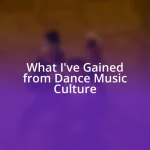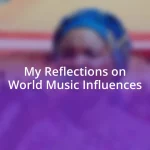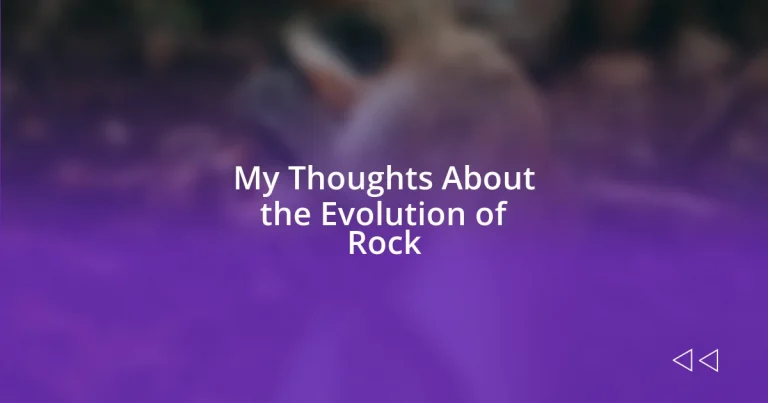Key takeaways:
- Rock music originated in the late 1940s and early 1950s, blending genres like rhythm and blues, jazz, and country, serving as a voice for youth emotions and social changes.
- The British Invasion, counterculture movement, and punk rock significantly influenced rock’s evolution, leading to new sounds and themes resonating with societal shifts.
- Future trends in rock include genre blending, increased collaboration with diverse artists, and a revival of vintage sounds, all enhanced by technology and social media.
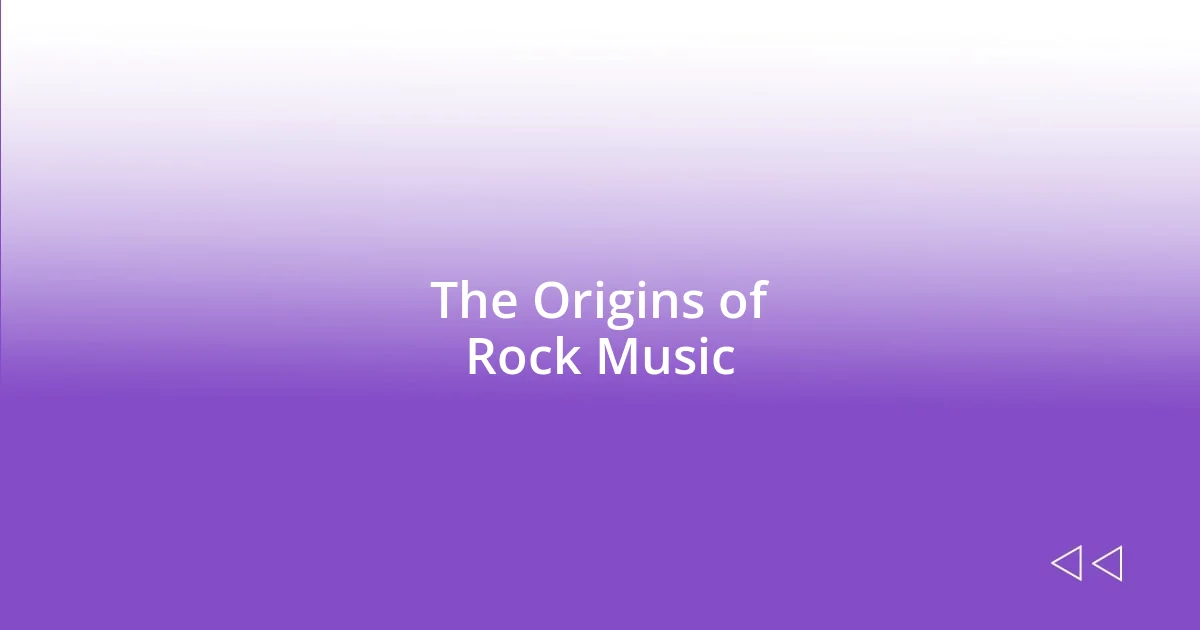
The Origins of Rock Music
Rock music originated in the United States during the late 1940s and early 1950s, blending elements of rhythm and blues, jazz, and country music. I remember the first time I discovered those early rock sounds; it felt like a vibrant jolt of energy that pulled me into a musical revolution. Doesn’t it make you wonder how something so rebellious came from such a diverse musical tapestry?
At its core, rock was a response to social changes and cultural shifts in America, aiming to give voice to the emotions of youth. The pounding rhythms and electrifying guitars reflected a sense of freedom and defiance. I can still recall my first live concert—a local band jumping around on stage with such fervor. It was a celebration of that very spirit, and I felt part of something bigger than myself, didn’t you?
Looking at its roots, one can see how artists like Chuck Berry and Little Richard laid down the foundation of this genre, showcasing the potential for storytelling and raw emotion in music. It’s intriguing to think about how those early songs encapsulated not just a sound, but a way of life that resonated with so many. When I reflect on it, I realize that rock music became a medium through which generations expressed their hopes and struggles, shaping our cultural narrative in profound ways.
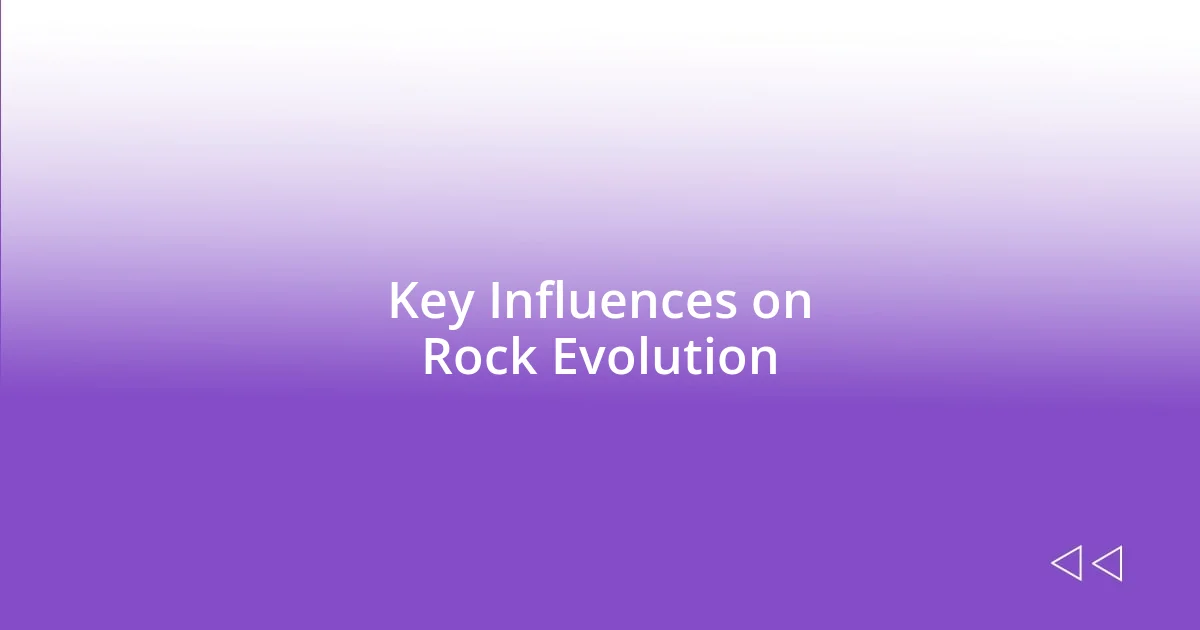
Key Influences on Rock Evolution
The evolution of rock music has been profoundly influenced by various cultural and musical movements. For instance, the British Invasion of the 1960s, led by bands like The Beatles and The Rolling Stones, brought a fresh perspective that blended rock with pop sensibilities. I remember hearing “I Want to Hold Your Hand” for the first time, and it completely reshaped not just the sound of rock but also its global appeal. It makes me reflect on how music transcends borders, doesn’t it?
Another significant influence came from the counterculture movement of the 1960s and 1970s. Musicians like Jimi Hendrix and Janis Joplin channeled the feelings of rebellion, freedom, and experimentation that defined a generation. I can almost feel the electric atmosphere of a smoky bar where a passionate guitar solo echoed, capturing the essence of that time. It’s incredible how these artists used their platforms to express not just their music but also their experiences and emotions, helping us connect on a deeper level.
The rise of punk rock in the late 1970s marked a critical shift as bands like The Ramones and Sex Pistols introduced a rawness that challenged the status quo. I recall listening to “Blitzkrieg Bop” with a sense of urgency that mirrored my own teenage angst. It’s fascinating how punk reassured us that it was okay to be loud, brash, and honest. These influences shaped rock into a vehicle for personal and political expression, echoing the ever-changing landscape of society around us.
| Influence | Key Bands/Artists |
|---|---|
| British Invasion | The Beatles, The Rolling Stones |
| Counterculture Movement | Jimi Hendrix, Janis Joplin |
| Punk Rock | The Ramones, Sex Pistols |

Major Genres in Rock History
The landscape of rock music is as diverse as the emotions it evokes. Each major genre within rock tells a unique story, shaped by the cultural context and creative energies of its time. Personally, I always find it fascinating how one genre can lead to the emergence of another, creating an intricate web of musical evolution.
- Classic Rock: This genre, rooted in the ’60s and ’70s, featured iconic bands like Led Zeppelin and The Who, blending blues and hard rock with profound lyrical themes. I remember countless road trips where “Stairway to Heaven” became the soundtrack, igniting a sense of adventure and nostalgia.
- Progressive Rock: Known for its intricate compositions and conceptual albums, this genre includes bands like Pink Floyd and Yes. Listening to The Dark Side of the Moon for the first time, I felt like I was taken on an otherworldly journey. The depth of the music made me question reality in ways I never expected.
- Heavy Metal: Emerging in the late ’60s and early ’70s, heavy metal, defined by bands like Black Sabbath and Metallica, pushed the boundaries of sound and intensity. I recall attending a metal concert and being swept up in the collective energy of the mosh pit. It was an exhilarating rush that made me realize the power of music to unite passionate fans.
- Grunge: In the ’90s, grunge, led by bands like Nirvana and Pearl Jam, introduced raw emotion and authenticity to the genre. Listening to “Smells Like Teen Spirit” for the first time felt almost revolutionary, as if it gave a voice to the disenchanted youth within me.
- Alternative Rock: This umbrella term encompasses many styles, giving rise to diverse bands like Radiohead and R.E.M. I still remember the acoustic guitar riff from “Creep” and how it resonated with my own feelings of alienation during high school.
It’s incredible to think of how each genre in rock history reflects a slice of life, revealing the shared experiences and emotions that resonate across generations. My journey through rock has not only expanded my musical horizons but has also deepened my understanding of the world around me.
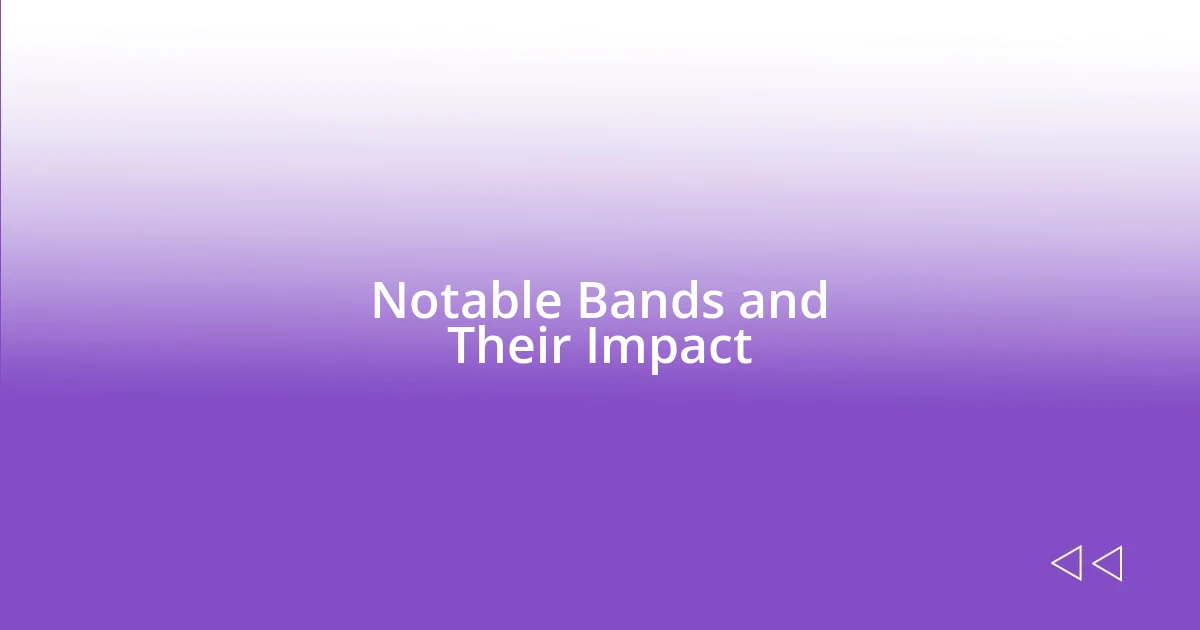
Notable Bands and Their Impact
One of the most notable bands that shaped rock music was Led Zeppelin. Their fusion of blues, folk, and hard rock was revolutionary, and “Whole Lotta Love” was like nothing I had ever heard. Every time that iconic guitar riff kicks in, I can’t help but feel a jolt of excitement—it’s as if the power of their music transcends time and space, connecting me to a collective memory of rock history.
Then there’s Queen, a band that transformed the rock landscape by blending theatricality with musical complexity. I vividly remember the first time I heard “Bohemian Rhapsody”—it was like a rollercoaster of emotions! The way they seamlessly transitioned between soft ballad and operatic rock created an experience that was not just about music; it was a storytelling masterpiece. How often do you find a song that takes you on a journey where every twist and turn keeps you both guessing and captivated?
Finally, consider Nirvana, whose raw sound and unfiltered lyrics resonated deeply with an entire generation. When I listened to “Come As You Are,” it felt like a declaration of authenticity—a reminder that we are all flawed and that it’s okay to be ourselves. Their impact was phenomenal, reminding us of the power of vulnerability in art. It’s fascinating to think about how these bands not only defined their eras but also set the stage for future generations to explore new creative horizons.
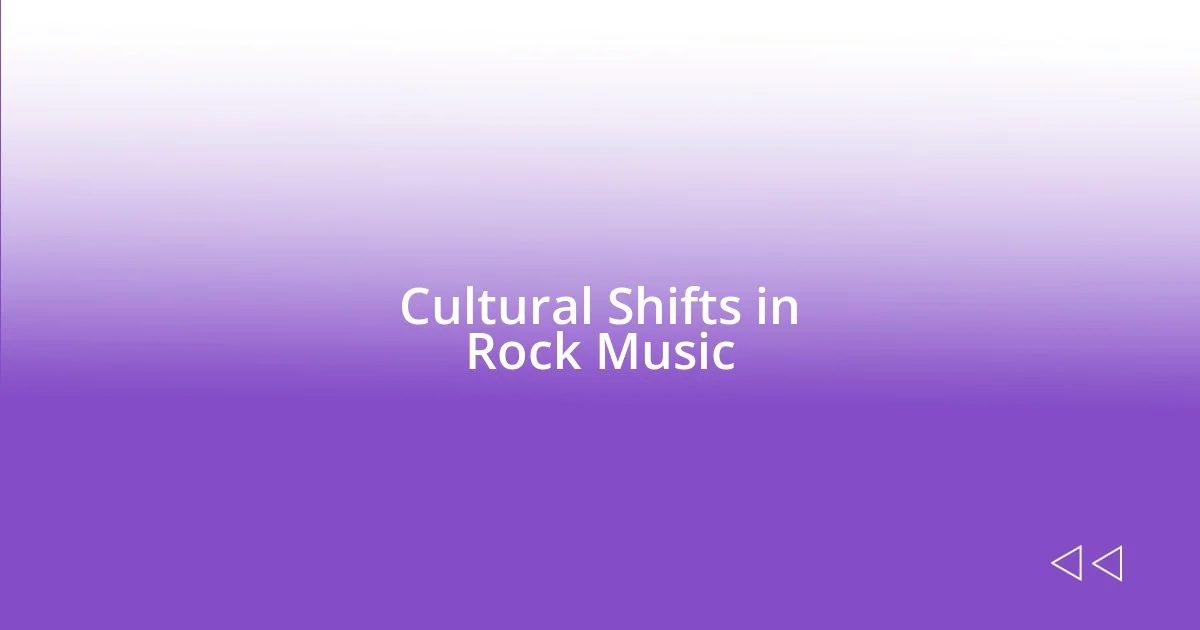
Cultural Shifts in Rock Music
As rock music has evolved, it has often mirrored the shifting cultural landscape of society. For instance, the counterculture movement of the ’60s birthed an explosion of creativity that challenged norms. I remember flipping through my dad’s vinyl collection, marveling at how the music served not just as entertainment, but as a form of rebellion—something that both shocked and intrigued me.
The ‘80s and ‘90s introduced a more commercialized approach to rock, marked by glam and grunge. During this era, I found myself drawn to the angst and authenticity that grunge bands like Soundgarden embodied. I can still recall how “Black Hole Sun” became my go-to track during tough times. It made me wonder: how does music provide such a relatable outlet for emotions we often struggle to articulate?
In today’s context, rock continues to adapt, embracing influences from hip-hop and electronic music. I’ve noticed how contemporary rock bands are blending genres, creating a vibrant tapestry that speaks to new generations. Listening to artists like twenty one pilots always leaves me awestruck, as they break down barriers and redefine what we consider rock. It’s fascinating to think about how each cultural shift not only influences the sound but also the very identity of rock music, connecting us across time and experiences.
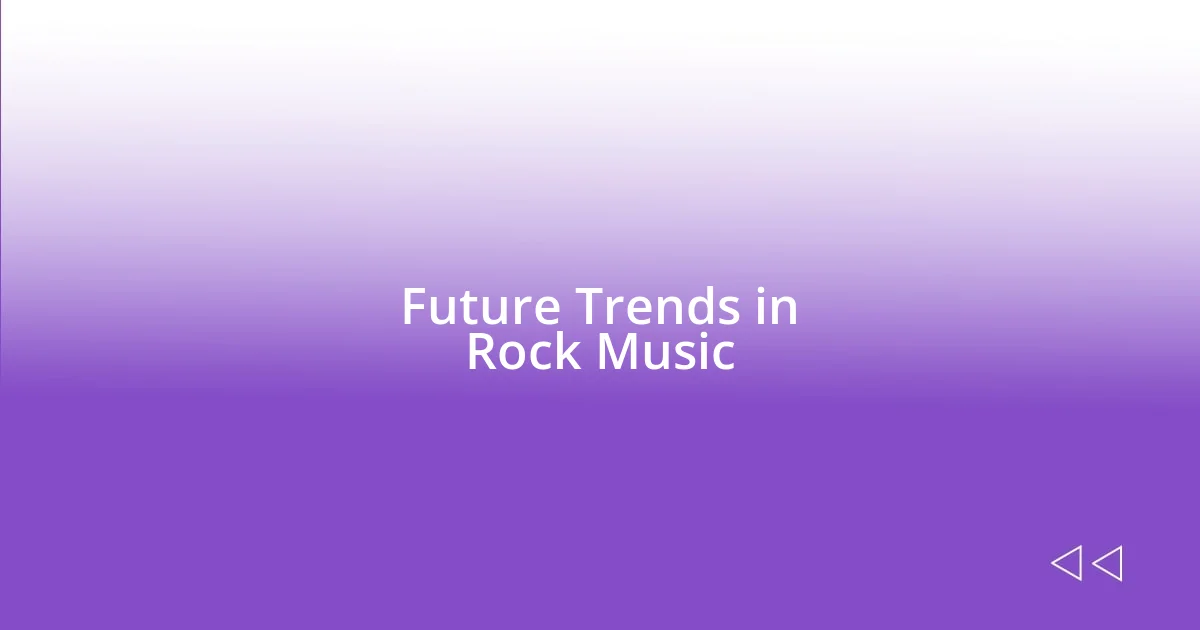
Future Trends in Rock Music
As I contemplate the future of rock music, I can’t help but feel a growing enthusiasm for its potential to evolve. One trend that I’ve been noticing is the increasing collaboration between rock artists and musicians from diverse genres. Recently, I stumbled upon a project where a rock band joined forces with a hip-hop artist, and the result was electrifying! It made me wonder—what other unexpected partnerships could emerge, possibly redefining the sound of rock in a way that resonates with audiences of all backgrounds?
Furthermore, technology is playing a pivotal role in shaping the future of rock. I’ve been impressed by how bands use social media and streaming platforms not just to distribute their music, but to create a community around it. I remember attending a virtual concert during the pandemic, where the interaction felt so genuine, as if we were all part of an intimate gathering. It poses the question: how far can technology enhance the concert experience while keeping that live energy intact?
Lastly, I see an intriguing revival of rock’s roots—artists are drawing inspiration from vintage sounds and storytelling techniques. There’s something nostalgic yet refreshing about this trend. I recently revisited an album that captured the essence of classic rock while integrating modern themes. It struck me that nostalgia could serve as a powerful tool for new artists to connect with both old fans and new listeners. What if the future of rock is about blending past influences with fresh perspectives, creating a dynamic that keeps the genre alive and evolving?



